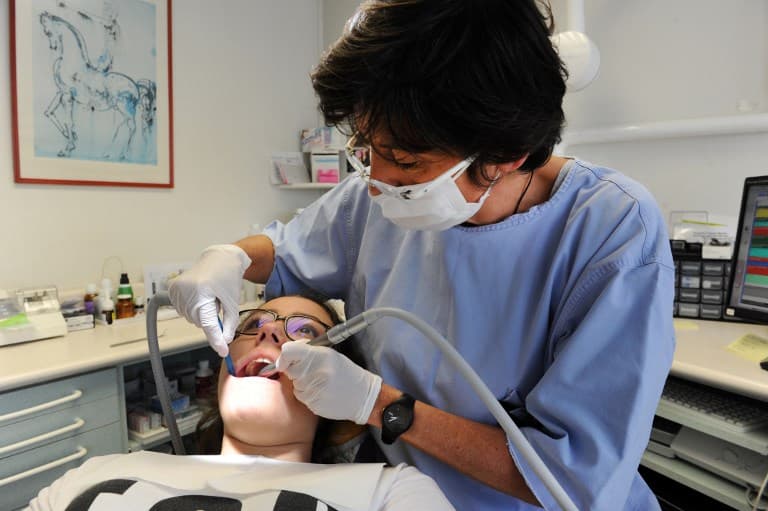Barcelona to launch Spain's first public (and cheap) dentistry service

The Catalan capital is looking to launch Spain’s first public orthodontist service, offering treatments for up to 40 percent less than through the private sector.
Barcelona residents with dental problems will soon be able to receive treatments on the public healthcare system thanks to a new measure spearheaded by the city’s mayor Ada Colau.
If approved by Barcelona’s Social Rights Commission on January 15th, it will be the first comprehensive public dentistry service of its kind in Spain.
Having a filling put in will cost €55 - 13 percent less than the average private rate - according to Spanish consumer rights group Facua.
A root canal will cost €160 (30 percent lower) whereas a deep dental clean will be €30 (43 percent lower).
Barcelona Town Hall will make the public service available to all its citizens after initially launching it only for its most cash-strapped residents through mutual insurance company PANEM.
The public health service add-on will help 36,000 people annually, Barcelona authorities have estimated.
“More than 12 percent of our population doesn’t go to the dentist because they can’t afford it, even though it’s essential to live a healthy life,” Barcelona left-leaning mayor Ada Colau is quoted as saying by El Periódico.
“And it’s not just physical health I’m talking about, there are also the emotional and psychological implications to consider.”

A number of opposition parties including Ciudadanos and Spain’s Popular Party have called the measure “implausible" and "unsustainable”, whereas socialist PSOE MP Xavier Trias labelled the move an “improvisation to gather votes”.
Barcelona City Council representatives have argued in response that the public dentistry clinic is “completely viable financially” in that it will be self-sufficient, as the initial €500,000 of public funds that will be invested will be recovered through dentistry earnings.
Barcelona’s first municipal dentist is likely to be based in either the district of Sant Martí, Nou Barris or Sant Andreu, where the need for cheaper dentistry services is greater among its cash-strapped residents.
Spain’s public health system was ranked as the world’s third best by Bloomberg in 2018, but the country’s social security system doesn’t cover dentistry services, aside from certain treatments for children.
According to orthodontist association SEPA, Spaniards have the worst dental hygiene and oral health in southern Europe.
“Dental care has always been considered a luxury in Spain,“ Javier Sanz, of Primary Health Care Association Semergen, told El Pais.
“Healthcare isn’t free, we pay for it with our taxes.
“Providing public dental treatments around Spain would mean having to take funds away from other fields, which could be very detrimental.”
Comments
See Also
Barcelona residents with dental problems will soon be able to receive treatments on the public healthcare system thanks to a new measure spearheaded by the city’s mayor Ada Colau.
If approved by Barcelona’s Social Rights Commission on January 15th, it will be the first comprehensive public dentistry service of its kind in Spain.
Having a filling put in will cost €55 - 13 percent less than the average private rate - according to Spanish consumer rights group Facua.
A root canal will cost €160 (30 percent lower) whereas a deep dental clean will be €30 (43 percent lower).
Barcelona Town Hall will make the public service available to all its citizens after initially launching it only for its most cash-strapped residents through mutual insurance company PANEM.
The public health service add-on will help 36,000 people annually, Barcelona authorities have estimated.
“More than 12 percent of our population doesn’t go to the dentist because they can’t afford it, even though it’s essential to live a healthy life,” Barcelona left-leaning mayor Ada Colau is quoted as saying by El Periódico.
“And it’s not just physical health I’m talking about, there are also the emotional and psychological implications to consider.”

A number of opposition parties including Ciudadanos and Spain’s Popular Party have called the measure “implausible" and "unsustainable”, whereas socialist PSOE MP Xavier Trias labelled the move an “improvisation to gather votes”.
Barcelona City Council representatives have argued in response that the public dentistry clinic is “completely viable financially” in that it will be self-sufficient, as the initial €500,000 of public funds that will be invested will be recovered through dentistry earnings.
Barcelona’s first municipal dentist is likely to be based in either the district of Sant Martí, Nou Barris or Sant Andreu, where the need for cheaper dentistry services is greater among its cash-strapped residents.
Spain’s public health system was ranked as the world’s third best by Bloomberg in 2018, but the country’s social security system doesn’t cover dentistry services, aside from certain treatments for children.
According to orthodontist association SEPA, Spaniards have the worst dental hygiene and oral health in southern Europe.
“Dental care has always been considered a luxury in Spain,“ Javier Sanz, of Primary Health Care Association Semergen, told El Pais.
“Healthcare isn’t free, we pay for it with our taxes.
“Providing public dental treatments around Spain would mean having to take funds away from other fields, which could be very detrimental.”
Join the conversation in our comments section below. Share your own views and experience and if you have a question or suggestion for our journalists then email us at [email protected].
Please keep comments civil, constructive and on topic – and make sure to read our terms of use before getting involved.
Please log in here to leave a comment.